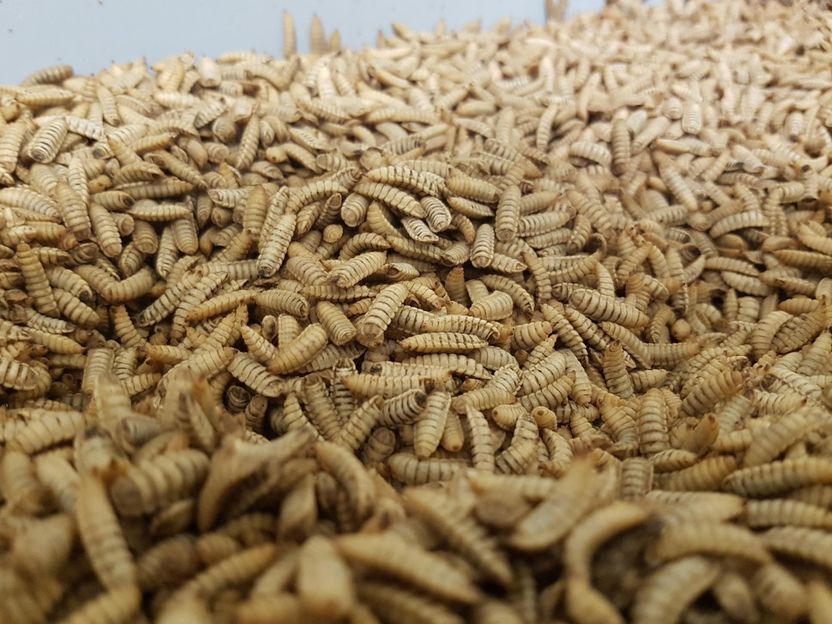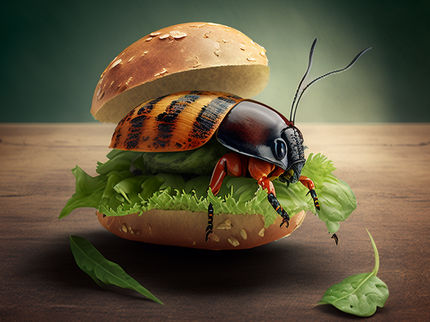Bühler opens Insect Technology Center to support customers in the feed and food industry
Advertisement
Bühler Group officially opens its world-class Insect Technology Center (ITC). The facility in Uzwil, Switzerland, combines Bühler's expertise with the best infrastructure to support the insect industry in its further development. In this application center, Bühler can conduct larval growth trials with various raw materials together with its customers, develop product samples, evaluate breeding solutions, and provide training. The ITC is already operational and has received funding from the Swiss Federal Office for the Environment (FOEN) for its contribution to a more sustainable food system.

Black soldier fly larvae cultured at the Insect Technology Center.
Bühler
"The opening of the Insect Technology Center is an important milestone in our journey. Over the past years, we have gained expertise and market maturity to serve various customers in the insect industry with suitable and reliable solutions. With our new facility, we are expanding our services and can even better support our customers in installing an industrial insect system," says Andreas Baumann, head of the Insect Technology market segment at Bühler.
At the heart of the center are two insect growth chambers that allow industrial production conditions to be mimicked. These chambers feature a sophisticated climate control system and are equipped with numerous sensors that provide valuable insights into the process. The data collected can be used to determine the right parameters and processes to ensure efficient insect production on an industrial scale. The ITC works with the two most important insect species for industrial production, the black soldier fly and the mealworm.
"A company that wants to build an industrial insect factory must cover several operational aspects. These include finding the right feedstock to raise the larvae; selecting a potent and suitable insect strain , establishing appropriate climatic conditions related to the larval growth cycle, and measuring emission data required for the permitting process," says Andreas Baumann. All these issues are important for a successful insect project and can be addressed at Bühler's new Insect Technology Center. In addition to the services offered to customers, the Bühler team will conduct its own tests to continuously improve technologies and services for the insect market.
Accelerating insect plant projects
The ITC aims to accelerate projects for large-scale insect plants. By using the new test facility, customers can demonstrate technological feasibility and may not need to invest in an expensive pilot plant. Seeing industrial insect technology in action makes it tangible and allows customers to directly tackle a commercially attractive plant size. Because insect growth chambers are mobile, they can be sent to any location, giving customers access to infrastructure worldwide. "In combination with the exchange of operational know-how, we see great potential here to shorten the overall time from project idea to a successfully operating plant," says Andreas Baumann.
Insects hold great potential for the future
Bühler is setting ambitious goals that will help mitigate climate change and build a more sustainable food system. Insects are a healthy and sustainable source of protein for human and animal nutrition. In addition, their feces can be used as fertilizer, contributing to the circular economy. The market for insect protein as feed is expected to reach half a million tons by 2030. By then, 30 percent of the total volume of insect protein is expected to be in the pet food sector and 40 percent in aquaculture. "We are committed to helping the industry reach its full potential. In recent years, we have achieved market maturity and built the capabilities to support the industry as it continues to develop. With proven technologies in our portfolio, we are ready to enable our customers to bring insect-based products to market," explains Andreas Baumann.
Note: This article has been translated using a computer system without human intervention. LUMITOS offers these automatic translations to present a wider range of current news. Since this article has been translated with automatic translation, it is possible that it contains errors in vocabulary, syntax or grammar. The original article in German can be found here.
































































